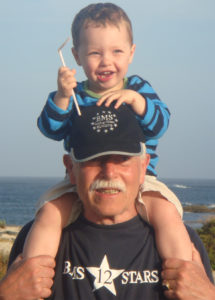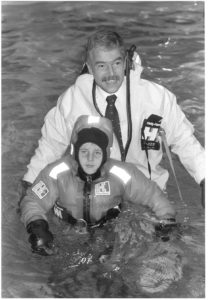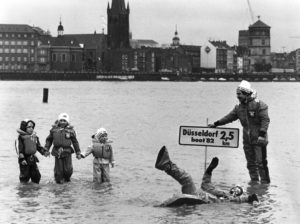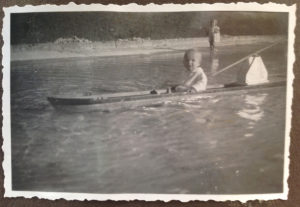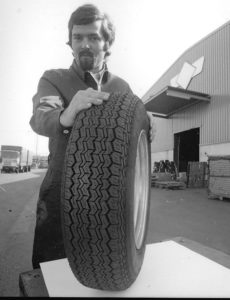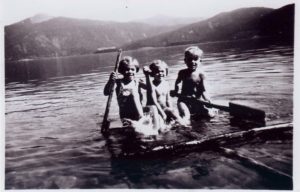The history of BMS
Bernd-Michael Schröder founded the outdoor specialist BMS in the Speicherstadt in 1987. Today the company supplies police, shipping companies and film teams. The company motto has remained the same ever since.
Hamburg. Sometimes Bernd-Michael Schröder has a problem with the quality of his products. “The policemen have been driving in our jackets on the Elbe for 20 years”, says the managing director of the Hamburg outdoor clothing manufacturer BMS. So he waits in vain for new orders, he says and laughs. Nevertheless, his company, based in the Speicherstadt, is on a growth course.
“We are growing by 30 percent every year in children’s clothing,” says the 69-year-old, who developed the idea for his products from his own experience as a surfer, sailor and father of a family. Recently, he has benefited above all from the expansion of the day nurseries. “Buddel trousers are the basic equipment for children and a must in every day-care centre”. More and more, the 27.95 Euro trousers come from BMS, whose products are available in 600 shops throughout Germany. In three years he wants to sell 100,000 Buddel trousers per year. Because 700,000 children are born in Germany every year, Schröder sees high growth potential. “Especially as 70 percent of parents are unaware of this type of clothing.”
Schröder started his career in the textile industry as a side entrant. “I am a tyre man,” says Schröder. In the 1970s, the trained industrial clerk worked and studied business administration as an assistant to the board at Phoenix Gummiwerke. He designed the first wide tyres for the Ford Focus together with friends. An order for life jackets brought him into contact with Helly Hansen. In principle, the production of all rubber products is the same. A mixture of raw and synthetic rubber is kneaded, rolled into sheets, placed over an aluminium mould and baked at around 200 degrees Celsius. “Helly Hansen is the inventor of the dry suit and was the first outdoor supplier,” says Schröder, who was employed by the Norwegians in 1979 as Managing Director for Germany. Under his leadership, functional underwear was helped to achieve a breakthrough in Central Europe, and the survival and dry suit was invented. “As a surfer, I always cooled my back,” he explains how he came up with the idea. When his children had the same problem playing outdoors, he designed the Buddel trousers. A dungaree made of polyurethane plastic that protects against wetness and mud. You can wear normal trousers underneath. “I see myself as a textile engineer,” he says. When he thought Helly Hansen’s prices were too high, wanted to relocate production to other countries and take over management of Central Europe, the Norwegians rejected the plans. The paths parted.
<b>The right niche was found during the crisis</b>
Schröder goes the way from employee to entrepreneur. In 1987 he founds BMS with 50,000 marks of equity capital, named after his initials. He has kept the company motto from then until today: The clothing must keep the body warm and offer lasting protection against wind, rain and snow. When his sailing suit won the test against 20 competitors in 1991 at the magazine “Yacht”, the breakthrough was made. He equipped several national sailing teams with his products. Four years later, the police also ordered from him. Fleece clothing, backpacks and caps of the law enforcement officers come from BMS. Later followed orders from shipping companies for the crews of the cruise ships “MS Europa” and the Aida series, from the environmental organisation Greenpeace and from camera teams for the film “Wild Guys”. “We produce for everyone who needs something special,” says Schröder. Small series are also possible, but more expensive. For next year’s European Equestrian Championships in Aachen, the company will supply the raincoats for the staff in charge.
At the end of the 1990s, however, the main business plunged into a crisis. The number of sailing shops in Germany fell by two thirds from 150 to 50. The sport lacked young talent and the business with chartered boats grew in warmer climes – its clothing was no longer in demand. “For us, this was already very critical,” says Schröder in retrospect. He looked for new niches and made a difference as a supplier of protective workwear and children’s fashion. Later, the softshell segment was added, and the company has also been manufacturing snow suits for three years.
With sailing equipment, the company now generates only around five percent of its sales instead of the almost 100 percent it used to generate. What began 27 years ago with two sailing suits and three jackets now comprises a range of 500 products sold in more than 30 countries. Sales are in the seven-digit range, says Schröder without becoming concrete. He also does not mention the profit: “We finance everything ourselves
and can live off it on a very good level.”
<b>Of the seven employees, four belong to the Schröder family</b>
The biggest sales driver with a share of ten to 15 percent is a coat with the name HafenCity Coat, which is decorated with a label with the Elbphilharmonie. The future Hamburg landmark will be built on Kaispeicher A – where BMS had its first warehouse. In three years, every third euro is to be raised by the coat designed two years ago. This is the latest addition to the company’s portfolio. The Sorona fibre is based on renewable raw materials such as maize and ensured that the boss had to reassure many a customer. “When you stand in the sun with it, no popcorn pops up,” says Schröder with a smile.
Basically, he attaches great importance to sustainability. All his materials are certified by Ökotex. The seal stands for 100 percent freedom from harmful substances. Fair working conditions in the textile industry, rich in scandals and grievances, are also important to him. His products are mainly manufactured at five Chinese family-owned companies between Shanghai and Hong Kong. “Inspectors can come there at any time,” Schröder is convinced of the working conditions there. Every two months, together with his son and designated successor Mikko, 39, he flies to Asia and looks after the rights.
The designs for the clothing, however, come from the old storehouse at Sandtorkai. “Every stitch, every product is developed here.” The team consists of seven employees, four of them family members. Schröder’s daughters Wibke, 41, and Imke, 37, are also active in the company, and all the children are already partners. And even Schröder’s five grandchildren are clamped. As models, they follow in the footsteps of their parents, who have already posed for photographers. He is not afraid for the future of his company, even if he soon gives up his professional life – he doesn’t want to talk about work. Schröder: “I’ve never worked, I’ve fulfilled my dreams.”
<a href=”http://www.abendblatt.de/wirtschaft/article133652920/Erfolgsgeschichte-Vom-Reifenmann-zum-Textilingenieur.html” target=”_blank” rel=”noopener”>text: Wolfgang Horch – Hamburg evening paper 25.10.2014</a>

